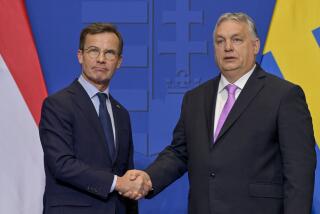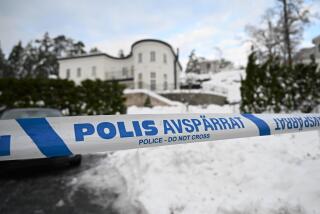Stig Wennerstrom, 99; Swedish Officer Spied for Soviets During Cold War
- Share via
STOCKHOLM — Stig Wennerstrom, a Swedish air force officer who supplied Moscow with military secrets for 15 years in his country’s biggest Cold War espionage scandal, has died. He was 99.
Wennerstrom died March 21 at a home for the elderly outside Stockholm, Swedish media reported. The cause of death was not reported.
Code-named “The Eagle” by his Soviet spy masters, Wennerstrom was convicted of four counts of treason in 1964 for revealing classified information from Sweden, the United States and the North Atlantic Treaty Organization.
He was pardoned and released in 1974 after authorities said the information he had obtained during his time as a spy was obsolete.
The Wennerstrom case shocked Sweden, a nonaligned country wedged between NATO and the Soviet bloc whose defense forces during the Cold War were geared toward resisting a Red Army invasion.
Wennerstrom confessed to having worked for the Soviets for 15 years, including his time as an air attache for the Swedish Embassy in Washington from 1952 to 1957.
He also worked as an air attache in Moscow from 1948 to 1952.
He transmitted Swedish defense secrets, such as missile plans and air defense control systems, to the Soviets -- information that could have been crucial for a military invasion. He also revealed Swedish military contacts with the United States -- a highly sensitive subject, given the country’s official policy of neutrality. He also gave the Soviets data on the Polaris submarine.
Sweden’s security police, SAPO, had suspected Wennerstrom of spying for the Nazis during World War II and of offering his services to Moscow after the war. The agency kept him under surveillance for years but could not find enough evidence to prosecute him.
The break came in 1963 when his housemaid, who was working for SAPO, found photographs of secret documents in his attic. He was arrested later that year.
For years, Swedes grappled with why Wennerstrom, born to an upper-class family in Stockholm, would betray his country to the Soviets. Money was not believed to be his motivation because he was not thought to have received any large sums from the Soviets. Experts on the case also ruled out ideology, suggesting instead that the Soviets had blackmailed him.
In his 1972 biography, “From the Beginning to the End: Memoirs of a Spy,” Wennerstrom said that by providing the Soviets with military secrets from the West, he was maintaining the balance of power and promoting world peace.
Two years before his death, Wennerstrom said in an interview with Swedish magazine Aret Runt that he did not regret anything.
“If I could live my life over again, I am stupid enough to let it be exactly the way it has been so far,” he said.
He is survived by his wife, Ulla, two daughters and six grandchildren.
More to Read
Sign up for Essential California
The most important California stories and recommendations in your inbox every morning.
You may occasionally receive promotional content from the Los Angeles Times.













